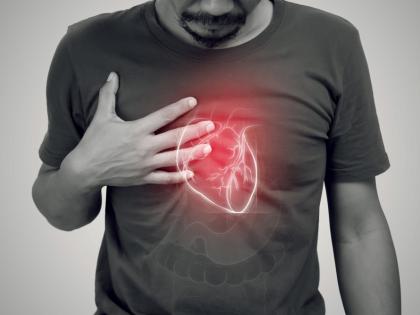COVID Survivors Face Higher Risk of Heart Failure Reveals New Japanese Study
By Lokmat English Desk | Published: December 27, 2023 03:13 PM2023-12-27T15:13:41+5:302023-12-27T15:38:01+5:30
Covid-19 survivors face a greater risk of suffering from heart illnesses as compared to those who did not get ...

COVID Survivors Face Higher Risk of Heart Failure Reveals New Japanese Study
Covid-19 survivors face a greater risk of suffering from heart illnesses as compared to those who did not get the disease and should be more cautious about their health and monitor risk factors for cardiovascular diseases. A recent study from Japanese researchers, revealed that in the absence of evident heart disease, patients who have battled the virus might face a heightened risk of heart failure due to lingering viral presence in their hearts.The team, comprising experts from Riken, Japan’s esteemed scientific institution, highlights an alarming prospect of a potential “heart failure pandemic” looming on the horizon.COVID-19 gains entry into the body by binding its spike protein to ACE2 receptors on human cell surfaces. Notably, the heart houses a higher concentration of these ACE2 receptors compared to other organs, potentially explaining the virus’s affinity for cardiac tissue. While some COVID patients exhibit reduced cardiac function, the intricate mechanisms behind these effects are yet to be fully comprehended.
In a pioneering approach, the research group engineered heart tissue using induced pluripotent stem (iPS) cells. They observed a decline in cardiac function upon infecting the tissue with varying amounts of the virus. Interestingly, when the infection level was reduced to 10%, a certain level of cardiac function persisted, albeit with the infection lingering for up to four weeks. This suggests the possibility that some individuals might not succumb to heart failure despite a persistent viral presence. Moreover, under hypoxic conditions designed to diminish cardiac function, uninfected cells displayed signs of recovery within a specific timeframe. However, cells housing a residual amount of the virus showcased a compromised ability to recuperate, indicating that persistent viral infection weakens their regenerative capabilities. Hidetoshi Masumoto, the lead researcher at Riken well-versed in regenerative medicine, underscored the potential for lingering viral infections in the hearts of COVID-19 survivors. He emphasized the critical imperative of establishing robust testing systems and treatment protocols in anticipation of a potential surge in heart failure cases—a precautionary measure essential to brace against what might unfold as a ‘heart failure pandemic.’
Also Read | Covid Sub-Variant JN.1 Cases Surge to 109 in India
"For people who have had severe Covid-19, their risk of heart ailments is higher by 2-3 times for at least one year. They need to exercise greater caution and ensure that they have their assessment done for risk factors for heart disease like diabetes, hypertension and bad cholesterol and make sure they are treated for the same if needed," said Dr. Ambuj Roy, Professor of Cardiology, AIIMS New Delhi, in his interview to HT. Roy says heart attacks in India are on rise due to multiple factors like poor diet, lack of exercise, tobacco use, uncontrolled high BP, stress and obesity. Adopting a healthy lifestyle with special focus on green vegetables and fruits, regular exercise, saying no to smoking, managing stress and weight can go a long way in taking care of heart health." Reducing the risk of a heart attack involves adopting behaviours that mitigate the risk and addressing any existing risk factors for heart disease. Embracing a heart-healthy lifestyle, which includes balanced eating rich in greens and fruits, regular physical activity, smoking cessation, stress management, and weight maintenance, is key to heart disease prevention. These changes remain beneficial even if you already have coronary artery disease, as they can diminish the likelihood of a heart attack. Additionally, it's crucial to seek treatment for other health conditions that elevate heart attack risk," said Dr Ambuj Roy.
Open in app